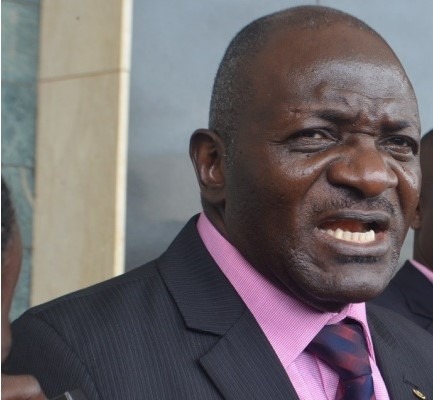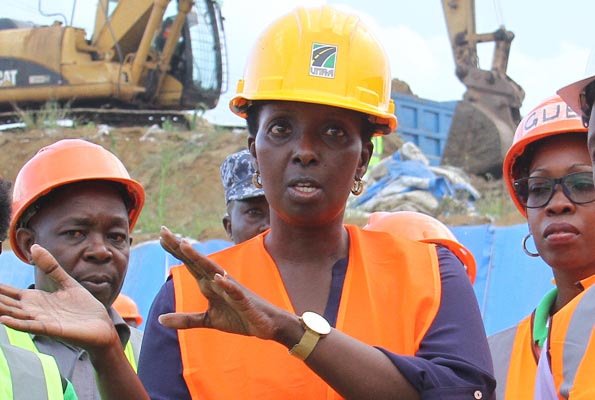The Public Private Partnership (PPP) arrangement is the only sustainable way to fix the many gaps in Uganda’s transport and logistics sector that have been exposed by Covid-19, Gen. Katumba Wamala, the Minister of Works & Transport, has said. This, as experts and practitioners in the sector call for a recalibration of the country’s transport mix to put more emphasis on rail and water transport.
Gen. Katumba Wamala said the government cannot realistically muscle all the finances required to deal with the horde of challenges currently experienced in the transportation and logistics sector. The minister made the revelation on Saturday (May 23) while speaking to a webinar on transport and logistics organised by a Kampala based Think Tank, Centre for Advanced Strategic Leadership (CASTLE), on the topic, “Covid-19: Opportunity to Thrive.” The wsebinar was moderated by Radio One’s Gabriel Iguma.
The transport and logistics sector is presently in the middle of a major hitch that has caused severe disruptions in the business. Following the global outbreak of the Covid-19 pandemic, government put in place interventions aimed at controlling the spread of the infection in the country. These include testing of truck drivers at the borders. This has seen significant disruption in transport and logistics business especially at the country’s access routes to the sea.
This has resulted in build-up of long lines of trucks along the borders awaiting clearance. Moreover, truck drivers are prohibited from interacting with the communities where they stop over- a factor that has hampered their access to basic essentials like food, sanitation facilities, among others, which has caused discontent among the trucking community. In the process there have been hold ups and delays of goods in transit.
In a keynote presentation Jennifer Mwijukye, the chief executive officer of Unifreight Group of Companies, listed a raft of gaps in the country’s transport and logistics sector – including on road, railway, water and air transport systems – that Covid-19 has exposed. She said that the pandemic has led the country to realise that for so long it had taken its transport sector for granted in spite of being landlocked. She said the country has realised that over reliance on road transport was a strategic oversight.
Data from the Uganda Bureau of Statistics shows that road transport accounts for 95 per cent of the country’s transportation supporting internal trade, import and exports. Other forms of transport –railways, water and air constitute the remaining 5 per cent.
With the coming of Covid-19, the country has realised that road transport through the truck drivers can actually become a public health problem, as the drivers have been on the spot for spreading the coronavirus infection in the region. In Uganda, about 80 per cent of the infections recorded are truck drivers, and another 10 per cent are people who had contact with them.
Mwijukye said the country ought to have learnt from the disruption that was experienced during the violence that followed Kenya’s general elections in 2007, where the road to the coast was cut off by riots in central Kenya, de-linking the country from the coast for weeks. She said a key gap that has been identified is that there is need for the country to reconsider its transport mix.
Besides over-reliance on road transport, she said over 80 per cent of trucks that bring goods to Uganda are owned in a foreign country; which makes the country over reliant on service providers from other countries. She said Ugandans should be enabled to purchase trucks so that road transport service providers are easier to manage. She said the drivers are not trained and were therefore a disaster when public health emergency arose.
As far as air transport is concerned, Mwijukye said that there was a realisation that the country actually relied on passenger flights for shipping its cargo to markets. Hence when passenger flights were stopped recently, there were no aircraft to take out the country’s perishable cargo vegetables and fruits to markets in Europe. This caused an escalation in air transport costs. This exposed the limited choices of transport modes available in a country. She said the same way countries that have coasts are utilising them for commercial activities, a landlocked country like Uganda with a great inland location can make itself a hub of commercial and logistics activity.
Allen Kagina, the executive director, Uganda National Roads Authority (UNRA) said the road network remains important in the country because the railways and water systems don’t take goods and services to the “arteries” of the country- to the final consumer points – where goods are consumed.
Eng. Charles Kateeba, managing director, Uganda Railways said the corporation is currently working round the clock to ensure that the main railway link to access to the sea is fixed. He said the corporation has repaired the railway line from Port Bell to Kampala which now enables goods to come through L. Victoria, both from Kenya (Kisumu) and Tanzania (via Dar es Salaam-Mwanza or Bukoba). He said the corporation has also fixed the line connecting the Tororo line with the Jinja pier. He said renovations on the Malaba -Tororo- Kampala line are ongoing.
Eng. Kateeba specifically answering a question from The Infrastructure Magazine said that efforts are also in place to open the wider northern Tororo – Gulu – Pakwach line that is hoped will relieve the road transport of some stress for cargo to northern Uganda and South Sudan. He said various studies had been completed on the viability of the line. He said however that funding remains the corporations biggest challenge that hampers it lack of progress in rolling out its mid and long term plans.
Dr. Merina Sebunya, the chairperson of the National Logistics Association, said transport and logistics are the backbone of the economy because all the economic activity in the country depends on them. Focussing efforts on manufacturing for exports, for example, without an efficient transport system renders all other efforts vain. She said Coivd-19 has enabled logisticians to put in place innovations like journey management systems, monitoring system to manage drivers and cargo- innovations she said will stay even after Covid-19.
Nathan Byanyima, the chairman of the Uganda Bus Owners Association, also a former member of Parliament for Bukanga in Isingiro district said Covid-19 should be a big lesson from which Uganda should re-think its approaches and systems. “We should not come out of Covid-19 empty handed; it should help us to get out of the confusion we have been in.”













